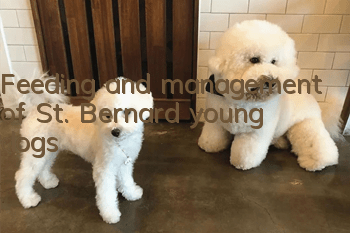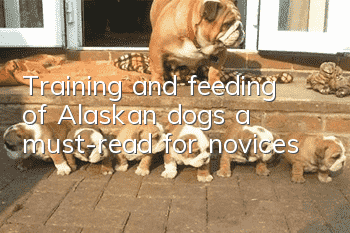Feeding and management of St. Bernard young dogs

Due to their huge size, some young pet dogs are troublesome to clean and raise. You should pay more attention to them. You can wipe their skin and coat with a warm towel every day, which can reduce the number of times they need to bathe. Generally, this It often takes half a day for a large dog to take a bath, so you only need to clean it up in time so that it won't be too hard. How should young St. Bernard dogs be raised and managed?
Saint Bernard
Raising and management of young dogs
Young dogs generally refer to dogs that are 4-6 months old after birth. This period is the fastest growth and development period for Saint Bernard dogs.
1. Feed
The feed for Saint Bernard young dogs requires high nutritional value, good palatability and easy digestion. In addition to being rich in protein, vitamins A, D, fat and other nutrients, the feed should also be supplemented with calcium, phosphorus and other essential nutrients that promote bone growth.
At the age of 4 months, do not overfeed the baby every time, otherwise, excessive weight may easily cause limb deformation, which is not conducive to bone growth.
At 6 months of age, the canine teeth have grown and can be used to chew cattle bones. In order to accelerate the development of the dog's body, the proportion of protein in the feed can be increased, especially animal protein should account for more than 1/3 of the total protein content, and the proportion of energy feed should be increased at the same time. Daily feeding should be done regularly, quantitatively, qualitatively and at a constant temperature, at least 3 times a day. The food must be fresh and freshly cooked and fed, and rotten feed must not be fed. Tableware should be cleaned after use and disinfected regularly. To ensure the supply of clean drinking water for young dogs, special attention should be paid in summer and not to drink leftover sewage water to prevent gastroenteritis.
2. Management
1) Group management. Dogs of similar age, gender, breed and individual condition should be kept together, and individual dogs with bad temper and love to grab food should be selected and kept together with those who can be gregarious.
2) Regular deworming. Young dogs should also be dewormed regularly, usually once a month.
3) Observe carefully. Breeders should strengthen observation of the dog's eating situation and daily performance, find out the reasons in time when abnormalities are found, and take corresponding measures. Under large-scale breeding conditions, it is necessary to prevent the domineering behavior of individual dogs. Each dog's food intake and whether it is full or not depends on the breeder's detailed and long-term observation. At the same time, we should also pay attention to whether there is bullying among the dogs. Once found, they should be raised separately immediately.
4) Careful management. It is necessary to improve the hygiene inside and outside the house, remove feces and dirt in a timely manner, disinfect regularly, and strengthen food hygiene.
- What are the symptoms of allergies in dogs?
- Do all pugs have body odor?
- How should dogs be cared for in autumn? Pay attention to these 3 points when caring for your dog in autumn!
- Before getting a dog, learn how to choose a dog that suits you
- Don’t give these 15 foods to your dog
- What causes dogs to become infected with scabies mites?
- What should I do if my dog gets stuck eating?
- St. Bernard dog appearance characteristics and feeding methods
- How to deal with ear mites in Bichon Frize
- Pet skin "ringworm" disease caused by fungi, treatment and prevention revealed!



